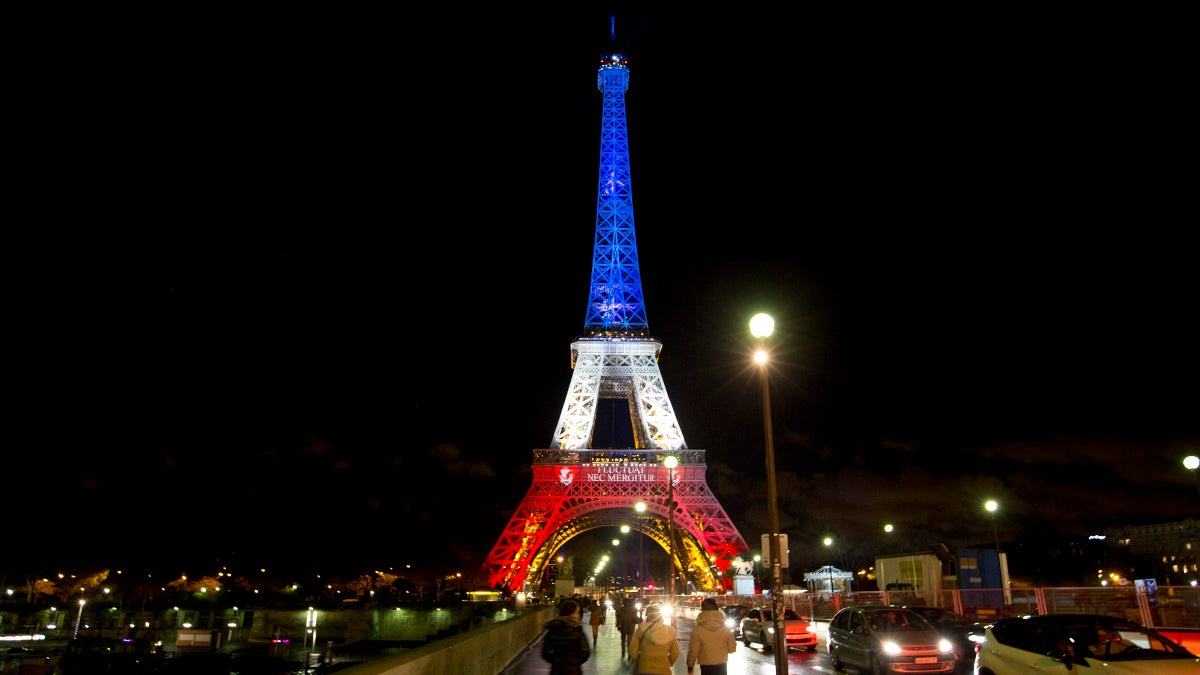Public demonstrations cancelled for Paris UN climate talks
Listen
People walk towards the illuminated Eiffel Tower in the French national colors of red
The global climate talks will go on in Paris, but activists worry about a clamp down on civil liberties.
Following Paris’s devastating terror attacks last week, French authorities wasted no time reassuring the public that the UN climate change negotiations set to start there at the end of the month would continue.
When reporters asked French Foreign Minister Laurent Fabius less than a day after the attacks if the global summit would be cancelled, he reportedly responded: “No, no, no, no, no, the COP21 [is] to be held.”
COP21is the UN acronym for the summit, where world leaders aim to agree to a legally binding document to limit global warming to 2 degrees Celsius and stave off the worst impacts of climate change.
Though the negotiations will go on, this week French authorities announced they would ban demonstrations in hard-to-secure outdoor spaces in Paris and other French cities amid security concerns.
That includes a huge march that had been scheduled in Paris for November 29, the day before the climate talks are set to start. A coalition of environmental groups had hoped the march would draw hundreds of thousands of people into the streets to push for strict global carbon reductions.
“Our concern is that the public voices that are really critical to making progress at the climate talks won’t be allowed to be a part of them,” said Jamie Henn, strategy and communications director for the climate activism group 350.org, one of the march’s organizers.
An un-permitted act of civil disobedience planned for outside the negotiation site on Dec. 12, when negotiations are expected to run into overtime, has also been cancelled.
While activists have showed their support for some enhanced security measures, Henn worries French authorities are clamping down on civil liberties.
“What we’re looking for is more of a guarantee that while the French government should prioritize public safety, it’s also prioritizing our civil liberties and the ability of civil society to take part in this process,” Henn said.
The French reaffirmed that the public should play a major role in the UN talks this week. An expo center open to the public near the negotiating rooms at the Le Bourget conference center will remain open despite the attacks, though it’s unclear if security or access will change.
Opinions differ on the importance of public demonstrations
What kind of impact the absence of large-scale public demonstrations will have on the UN negotiations and their outcome remains to be seen.
University of East Anglia lecturer Heike Schroeder researches the role of observers at international climate change negotiations. She believes protests can raise the profile of climate talks among the general public.
“Someone who might not really be so concerned about climate change but sees on TV a massive demonstration happening will say, ‘Oh, yes, I remember, yes climate change, we need to do something about it,'” Schroeder said. “So on that level absolutely would there be an impact.”
But Schroeder is skeptical that public demonstrations have much impact on the negotiations. She argues diplomats in Paris will be too busy haggling over the text of the agreement to register the lack of protesters outside their negotiating chambers.
“Just because the negotiators are usually so shielded off from anything else that goes on in the world, that they probably wouldn’t notice,” Schroeder said.
Jackie Smith, a sociology professor who researches social movements at the University of Pittsburgh, disagrees.
Smith and some activists argue that visible protests give governments with less bargaining power, often those in the global South, popular legitimacy to push for stronger carbon restrictions.
“These protests can support governments like the government of Bolivia and really give them the support they need to really stand up to the pressure that they’ll face when they oppose the policies of major governments,” Smith said.
Following failed international climate talks in Copenhagen in 2009, the Bolivian government strengthened ties with environmental groups and held a “people’s conference” on climate change.
“Bolivia has really been a leader in promoting more dramatic responses to climate change and really advancing the cause of what’s called climate justice,” Smith said.
Even with tightened security measures, the terrorist attacks are sending a ripple of worry through some conference attendees.
“I am a bit concerned about being in crowded areas, since the Paris actions lately, the very tragic ones,” said Jannie Staffansson, who lives in a remote town in Lapland, in northern Sweden.
Staffansson is representing the indigenous Sami people of Scandinavia at the Paris talks. She said she is scared, but not scared enough to stay home.
“This too important an event to ignore,” Staffansson said. “Of course I’m not going to be reckless, I’m not going to put myself in situations where something could happen, but you cannot just be afraid, because then the terrorists will have won.”
Hundreds of thousands will no longer crowd Parisian streets for a march, but 350.org’s Jamie Henn said activists are already thinking of different ways to leave a mark.
“That could look like everything from smaller gatherings that could be permitted to making noise in the streets in various ways, from banging on pots and pans to finding even more creative ways to make our voices heard,” Henn said.
The two-week conference starts November 30, so activists have about a week and a half to brainstorm.
WHYY is your source for fact-based, in-depth journalism and information. As a nonprofit organization, we rely on financial support from readers like you. Please give today.



